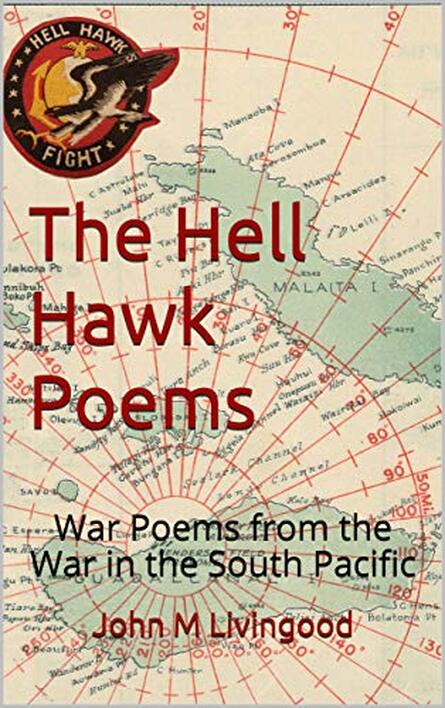|
Paperback format at Amazon.com
ebook format at Amazon.com Ten additional ebook retailers. (Apple, Kobo, Everland, Thalia, Smashwords, Indigo, Angus & Robertson, Mondadori, Vivlio, Palace Marketplace.) A collection of poems from World War II, primarily focusing on the war in the South Pacific and, in particular, the Solomon Islands Campaign. The poems were collected by William C. Livingood while he was a Flight Surgeon assigned to the U. S. Marine Corps fighter squadron, VMF-213, also known as the Hell Hawks. Many of the poems were written by a VMF-213 pilot, Theron Hart Brown, III. One poem was written by the famous journalist, Frank McCulloch, as a Marine, prior to starting his career after the war as an investigative reporter. A number of the poems are anonymous. Context for the poems is provided in an Introduction and in individual commentary after the poems. Best efforts were made in attributing authorship of each poem.. The VMF - 213 website documents the hardships of combat and of environmental conditions, establishing a remarkable context for the poems in this collection.
|
Table of Contents
List of Poems By Section:
Section A: Poems Identified with VMF-213
Section B - Poems Identified with WWII Marines in the South Pacific
Section C: Handwritten Poems on the Islands and Australia
- Preface
- Introduction: VMF-213 and the Solomon Island Campaign
- Section A: Poems Identified with VMF-213
- Section B - Poems Identified with WWII Marines in the South Pacific
- Section C: Handwritten Poems on the Islands and Australia
- Map Appendices
List of Poems By Section:
Section A: Poems Identified with VMF-213
- TWO-THIRTEEN AND THEIR F4U’S
- Thoughts of Riding the Tontouta Express
- Orders for Two-Thirteen
- THE BUG OF FATE!
- In Memoriam - Wade H. Britt, Jr.
- Why?
- Up There in the Skies
- "SNAFU"
- IN FLIGHT
- Letter To:
- THE PLANE IN FLIGHT
- Dedication to Major Weissenberger
- OVER THE HORIZON
Section B - Poems Identified with WWII Marines in the South Pacific
- The Graves of Gavutu
- “OUR FIGHTING MEN”
- THE ROAD TO GIZO BAY
- WHAT MAKES A MARINE
- Expressions of a Marine’s opinion
- EDSON’S RIDGE
- THE U. S. MARINES
- THE ONLY WAY TO WIN
Section C: Handwritten Poems on the Islands and Australia
- Song of the Island
- A Poem Fresh from Australia
- Ode to the End of Time
- Tropical Duty
Select Hell Hawk Poems included in Education Project
Approximately, 8 of the above poems with a picture of the survivors of VMF-213's three combat tours were included in a significant education project, "Understanding Sacrifice." The project is sponsored by the American Battle Monuments Commission (ABMC) and the VA National Cemetery Administration (NCA). The project was in partnership with National History Day and the Roy Rosenzweig Center for History and New Media.
Approximately, 8 of the above poems with a picture of the survivors of VMF-213's three combat tours were included in a significant education project, "Understanding Sacrifice." The project is sponsored by the American Battle Monuments Commission (ABMC) and the VA National Cemetery Administration (NCA). The project was in partnership with National History Day and the Roy Rosenzweig Center for History and New Media.
